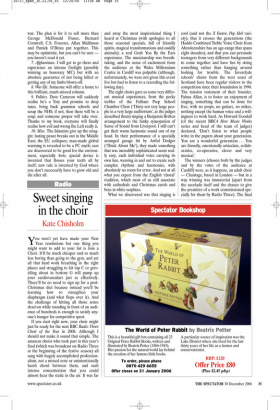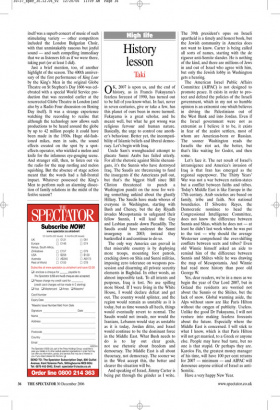Sweet singing in the choir
Kate Chisholm
You won’t yet have made your New Year resolutions but one thing you might want to add to your list is Join a Choir. It’ll be much cheaper and so much less boring than going to the gym, and yet all that hard work breathing in the right places and struggling to hit top C or gravelling about in bottom G will pump up your cardiovasculars just as effectively. There’ll be no need to sign up for a postChristmas diet because instead you’ll be learning how to strengthen your diaphragm (and what flops over it). And the challenge of hitting all those notes dead-on while standing in front of an audience of hundreds is enough to satisfy anyone’s hunger for competitive sport.
If you start right now, your choir might just be ready for the next BBC Radio Three Choir of the Year in 2008. Although I should not make it sound that simple. The amateur choirs who took part in this year’s final (which was broadcast on Radio Three at the beginning of the festive season) all sang with hugely accomplished professionalism, not a missed note or unintentionally harsh chord between them, and such intense concentration that you could almost hear the static in the air. It was far and away the most inspirational thing I heard at Christmas (with apologies to all those seasonal specials, full of friendly spirits, magical transformations and cuddly animals); a real Grab You By the Ears experience. The musicianship was breathtaking, and the sense of excitement from the audience at the Wales Millennium Centre in Cardiff was palpable (although, unfortunately, we were not given this event live but had to listen to a recording the following day).
The eight choirs gave us some very different musical experiences, from the perky trebles of the Fulham Prep School Chamber Choir (‘Thirty not very large people in a very large auditorium’, as the judges described them) singing a Benjamin Britten arrangement to the funky syncopation of Sense of Sound from Liverpool. I still can’t get their warm harmonic sound out of my head. In their performance of a specially arranged garage hit by Artful Dodger (‘Think About Me’), they made something that was incredibly sophisticated seem really easy, each individual voice carrying its own line, weaving in and out to create such complex rhythms and harmonies, with absolutely no room for error. And not at all what you expect from the English ‘choral’ tradition, which most of us still associate with cathedrals and Christmas carols and boys in white surplices.
What we discovered was that singing is cool (and not the X Factor, Pop Idol variety), that it crosses the generations (the Haddo Combined Treble Voice Choir from Aberdeenshire has an age-range that spans eight decades), and that you can persuade teenagers from very different backgrounds to come together and have fun by doing something rather than hanging around looking for trouble. The Inverclyde schools’ choirs from the west coast of Scotland have been regular visitors to the competition since their foundation in 1998. The mission statement of their founder, Palma Allan, is to foster an enjoyment of singing, something that can be done for free, with no props, no guitars, no mikes, nothing except the human voice and a willingness to work hard. As Howard Goodall (of the recent BBC4 How Music Works series and head of the team of judges) declared, ‘Don’t listen to what people write in the papers about your generation. You are a wonderful generation ... You are friendly, emotionally articulate, collaborative, co-operative, clever and very musical.’ The winners (chosen both by the judges and by the votes of the audience at Cardiff) were, as it happens, an adult choir — Chantage, based in London — but in a way winning was immaterial (apart from the accolade itself and the chance to give the première of a work commissioned specially for them by Radio Three). The final itself was a superb concert of music of such stimulating variety — other competitors included the London Bulgarian Choir, with that unmistakably raucous but joyful sound — and such compelling immediacy that we as listeners felt as if we were there, taking part (or at least I did).
Just a brief mention, too, of another highlight of the season. The 400th anniversary of the first performance of King Lear by the King’s Men in the original Globe Theatre on St Stephen’s Day 1606 was celebrated with a special World Service production that was recorded earlier at the resurrected Globe Theatre in London (and also by a Radio Four discussion on Boxing Day itself). It was a strange experience watching the recording to realise that although the technology now allows such productions to be heard around the globe by up to 42 million people it could have been made in the 1930s. Huge old-fashioned mikes, men in suits, the sound effects created on the spot by a spoteffects operator, who wielded a melon and knife for the infamous eye-gouging scene. And stranger still, then, to listen out via the radio for the map rustling and melon squishing. But the absence of stage action meant that the words had a full-frontal impact. Whatever possessed the King’s Men to perform such an alarming dissection of family relations in the midst of the festive season?





































 Previous page
Previous page